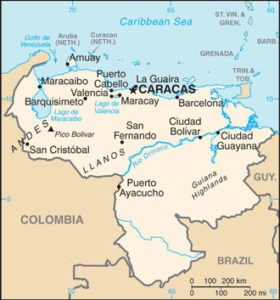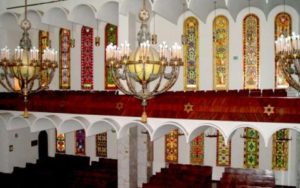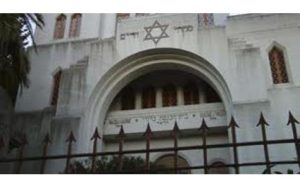 Jews likely first settled in Venezuela in the 17th century. Jews did not begin to settle permanently in Venezuela again until the middle of the 19th century. The ties between Jews in the Dutch island colonies and Venezuela increased more dramatically between 1819-1821 after its new constitution called for religious freedom. In 1820, the first Jewish family settled in the town of Core, which has a Jewish cemetery with tombstones dating back to 1832. Other Jewish communities began springing up in Caracas and Puerto Cabello in the 1840s. In 1844, groups of Jews from Morocco came to the town of Barcelona and, in 1875, they were granted permission to establish a Jewish cemetery.
Jews likely first settled in Venezuela in the 17th century. Jews did not begin to settle permanently in Venezuela again until the middle of the 19th century. The ties between Jews in the Dutch island colonies and Venezuela increased more dramatically between 1819-1821 after its new constitution called for religious freedom. In 1820, the first Jewish family settled in the town of Core, which has a Jewish cemetery with tombstones dating back to 1832. Other Jewish communities began springing up in Caracas and Puerto Cabello in the 1840s. In 1844, groups of Jews from Morocco came to the town of Barcelona and, in 1875, they were granted permission to establish a Jewish cemetery.
 Toward the end of the 19th century, the Venezuelan Jewish community was in dire need of a permanent place of prayer. It was not until the arrival of North African and eastern European Jews in the 1920s and 1930s, however, that the Jewish community began to fully develop. By 1943, nearly 600 German Jews had entered the country, with several hundred more becoming citizens after World War II. By 1950, the community had grown to around 6,000 people, even in the face of immigration restrictions. With the fall of dictator Perez Jimenez in 1958, more than 1,000 Jews emigrated to Venezuela from Egypt, Lebanon, Syria, Salonica, Turkey, and Israel.
Toward the end of the 19th century, the Venezuelan Jewish community was in dire need of a permanent place of prayer. It was not until the arrival of North African and eastern European Jews in the 1920s and 1930s, however, that the Jewish community began to fully develop. By 1943, nearly 600 German Jews had entered the country, with several hundred more becoming citizens after World War II. By 1950, the community had grown to around 6,000 people, even in the face of immigration restrictions. With the fall of dictator Perez Jimenez in 1958, more than 1,000 Jews emigrated to Venezuela from Egypt, Lebanon, Syria, Salonica, Turkey, and Israel.
 The biggest waves of immigration occurred after World War II and the 1967 Six-Day War, when a large influx of Sephardi Jews from Morocco arrived and settled mostly in the capital of Caracas. The Jewish population in Venezuela peaked at 45,000, largely centered in Caracas, but with smaller concentrations in Maracaibo.
The biggest waves of immigration occurred after World War II and the 1967 Six-Day War, when a large influx of Sephardi Jews from Morocco arrived and settled mostly in the capital of Caracas. The Jewish population in Venezuela peaked at 45,000, largely centered in Caracas, but with smaller concentrations in Maracaibo.
Everything was good until the late 1990s when Hugo Chavez was elected president. Chavez was harshly anti-Israel and anti-Semitic and encouraged discrimination against the Jews. In 2009, 15 unidentified men broke into Caracas’ oldest synagogue and destroyed holy books, and a homemade bomb was hurled into a neighboring synagogue the following month. In the mid-2000s, Chavez, expelled the Israeli ambassador. In addition to the antisemitism, the economy was getting worse and a lot of people started leaving the country.
 His successor Nicolás Marudo, was another of the same calibre. Under his reign inflation has skyrocketed, leading to shortages in food and basic supplies such as medicine and toilet paper. Venezuelans stand in long lines, sometimes for 12 hours, just to obtain bare essentials and kidnappings are becoming more and more prevalent. Tens of thousands have left the country, including a growing number of Venezuelan Jews who have relocated to Israel.
His successor Nicolás Marudo, was another of the same calibre. Under his reign inflation has skyrocketed, leading to shortages in food and basic supplies such as medicine and toilet paper. Venezuelans stand in long lines, sometimes for 12 hours, just to obtain bare essentials and kidnappings are becoming more and more prevalent. Tens of thousands have left the country, including a growing number of Venezuelan Jews who have relocated to Israel.
In the mid-1990s there were approximately 25,000 Jewish residents of Venezuela. Today, the Jewish population of Venezuela is estimated to be approximately 5,000-6,000.